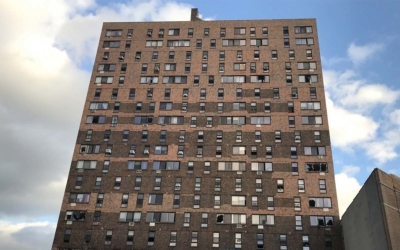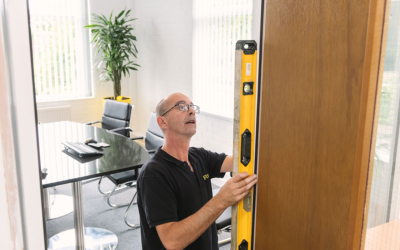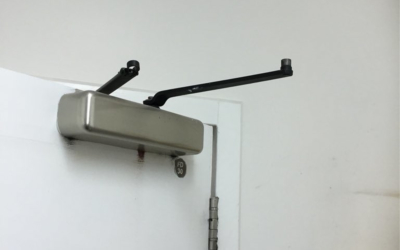Every time you leave a fire door open, a fairy dies.
I know, I know, it’s not true, is it? Fairies aren’t even real (or are they?). But the way that some fire safety people insist that fire doors are kept closed, you could be fooled into thinking that there is some truth in my opening statement.
In the event of a fire, your specially designed, expertly fitted fire doors have the important job of preventing the spread of fire. So many lives have been saved by these wooden heroes. It doesn’t surprise me that some fire safety people go into full-on meltdown if they are left open.
Part of the reason for this is that people use some pretty unsavoury things to hold fire doors open; wooden wedges, wastepaper bins, chairs, bits of folded over cardboard, even fire extinguishers. There will always be a need or desire for fire doors to be held open. The problem here is that all these things prevent doors from closing in an emergency, and wedging fire doors can have serious implications.
There are many benefits to keeping fire doors open and there are some very cost effective and easy to fit LEGAL devices do this. More importantly, they automatically close the door when there is a fire.
For the last few decades, hardwired devices have been favourable and more recently, with significant improvements in digital signal processing, wireless products, such as Dorgard Pro and Freedor, offer solutions that are much quicker, cleaner and safer to install.
“Ah,” I hear you say, “but we enforce a closed door policy, so we’re fine thanks.” This, on the surface, is a sensible policy. But (and there is a but) a closed door policy is never a closed door policy. By its very nature someone, somewhere, will undermine this on an almost daily basis by finding new and ever more extravagant means of holding open a fire door. In fact, what this policy does is actively encourage people in your building to wedge doors open by not giving them a safer alternative. Closed door policies are just not practical.
Let’s look at halls of residence, for example, where students are seven times more likely to have a fire. Whats the first thing students will do when they start to carry heavy boxes into the building when they move in? They wedge the doors so that they can get through without struggling. And when it’s time for them to move out, what happens? Wedged doors.
During my time in halls, every party (of which there were many) meant finding things to wedge our bedroom doors open with. Once there was even a food fight between my floor and the floor below. The closed door policy somewhat scuppered our game. So we disregarded the closed door policy by immediately wedging two floors worth of fire doors. Oh, and I haven’t told you about the girl with a broken leg who was effectively house bound by the closed fire door policy in her accommodation.
Occasionally a premises will allow ‘temporary wedging’ for access. Where’s the guarantee that people will un-wedge the door when they’re done? There isn’t one. They’ll leave that job for you. This is one of many real world, human examples of where a closed door policy will fall down. Want proof? Just take a look on Twitter.
Closed door policies are ignored by pretty much everyone except those who have to enforce them.
And let’s be honest, enforcing this kind of policy is probably the most thankless task we can think of. You have to spend huge portions of your day going round, checking all the doors, removing any wedges, taking time away from the really important things. Training and re-training colleagues and co-workers on the importance of not wedging open fire doors. Constantly fighting an uphill battle. And round and round it goes.
Where will it stop? Hopefully not with a fire.
We don’t like having our time wasted, especially at work. We all have many responsibilities in our jobs. Should it be your responsibility to constantly reprimand people for making their own lives easier? Wouldn’t your working life be easier if you had one less thankless task to carry out? Wouldn’t your building be safer if your fire doors could close when they needed to? Don’t you want to save the life of a poor little fairy?
You might also like
Some Of Our Door Closers Are Still Missing.
It’s not easy to write about actual fires. Where lives have actually been lost. It’s a sensitive subject, after all. I don’t enjoy it. No doubt there’ll be some who will (I would say somewhat cynically) assume that, by doing so, one is taking advantage of a tragedy,...
How to check your fire doors
It’s important to address the use and maintenance of fire doors. Fire doors can become damaged with regular use. Our checklist covers the basics of what to look out for to make sure your fire doors are safe and compliant.
Some Of Our Door Closers Are Missing
For those of us that know our RRFSO’s from our BS7273-4’s, there’s no question that fire doors save lives and that the weight associated with operating a fire door is a necessary evil, a symptom of those innocuous-looking closers that ensure doors can shut safely. But when we think about who uses those doors on a daily basis, are we expecting too much from industry outsiders?








What a brilliant website.
Thanks, Rudyard. Coming from the author of The Jungle Book and Just So Stories, that’s some serious praise. And your descendants make some mighty fine, no, exceedingly good cakes.